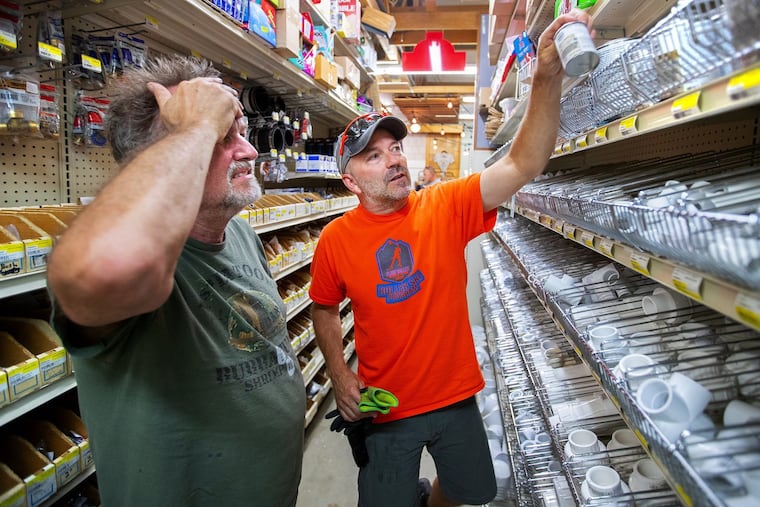Retail survivors: How a family-owned hardware store is making it in the Amazon era
How a small hardware store has carved out a niche to survive and even thrive by providing expertise , personal service and community support.

Rob Whitten had fled corporate life west of the Cascades and was working in construction when he got to know the owners of the small hardware store in Plain, Wash.
One day, they offered to sell. He took the plunge into retail 21 years ago, just as it began a massive transformation with the blossoming of e-commerce.
From the start, Whitten knew that Plain Hardware, buoyed as it is by a building boom in the surrounding vacation communities, would have to adapt to compete in the Amazon era, with its bottomless selection, always-on availability, and ever-faster delivery speeds.
“They’ve transformed customers’ expectations for fairly quick fulfillment, and that will never go away,” Whitten said. “Our job is to figure out how we do it better than they do it.”
That means working with suppliers to ensure he’s never out of that key piece or tool a local homeowner needs to finish a project, today. “Instant fulfillment,” Whitten calls it.
Surviving in retail, as in many businesses, is the art of adapting. That’s never been more true than in the age of Amazon. In its first 25 years, the Seattle company’s relentless algorithmic efficiency and scale have fundamentally changed the game of buying and selling. But the experience of Plain Hardware reveals how small stores have carved out a niche to survive and even thrive by providing expertise, personal service, and community support.
The U.S. retail industry is enormous, generating some $5.3 trillion in sales last year. Online sales have grown to about 10% of that total. Amazon is expected to garner about 38% of online retail spending in the U.S. this year, according to eMarketer. Meanwhile, many long-tenured national brands have struggled and closed stores.
In Washington state, the number of retailers, including everything from hardware stores and grocers to restaurants and online merchants, shrank over the last quarter-century, even as the state’s population rose 40%. The state went from 11.3 retail establishments per 1,000 residents 25 years ago to 7.8 last year, according to an analysis of Washington Department of Revenue tax data.
That said, the “retail apocalypse” narrative can be overstated. As the National Retail Federation noted recently, stores are making a comeback as big brands invest in technology to modernize the shopping experience and better integrate physical locations with e-commerce operations for things such as order pickups and returns. This remains a risky bet, however, as retailers try to catch up with Amazon’s massive spending on technology and willingness to experiment with new retail concepts, such as the “4-star store” it opened in Seattle recently.
Three-quarters of the 550 independent retailers polled during the spring by the Institute for Local Self-Reliance, which calls for greater regulation of Amazon as part of its advocacy for decentralized economic power, considered competition with the Seattle-based company to be their top challenge.
Of course, thousands of small and mid-size businesses also use Amazon’s infrastructure to host digital storefronts, connect to customers, and deliver their wares. Some argue that Amazon’s third-party sellers business, now accounting for 58% of its physical gross merchandise sales, amount to an important lifeline for small business. Others see Amazon and its growing share of online sales as the greater threat.
‘Instant fulfillment’
Plain Hardware is helped by its location: Beside Just Plain Grocery & Gas, it’s the only other store in town. That remains an advantage, even in an era of next-day delivery. Most of the items Whitten sells are available on Amazon, often from 10 different vendors. (That said, people aren’t yet buying dimensional lumber or drywall on Amazon in significant quantities.) His nearest physical competitor is 14 miles away in Leavenworth, Wash. The big-box home improvement stores are farther off in Wenatchee, Wash.
To keep local builders and homeowners coming back, Whitten learns what they need — and want — mostly with “face-to-face interactions with customers … asking and listening,” he said. He augments that customer input with his knowledge as a builder, making sure to have all the little parts for finishing common building projects.
Whitten arranges weekly deliveries to ensure he doesn’t run out of key items without having to hold too much inventory in his relatively small store — about 5,000 square feet indoors, and a 10,000-square-foot outdoor lumberyard. He knows that a customer who is disappointed to find that the key that’s needed is out of stock probably won’t give him many second chances.
But when he does have what is needed to finish that day’s project a short drive away, he can compete with next-day Amazon Prime delivery and competitors farther down the road.
Plain Hardware, like other physical retailers, offers “instant gratification, instant fulfillment,” Whitten said. “Somebody walks into the store and they walk out with the shovel they need. Done deal.”
Amazon, the so-called everything store, also can’t deliver the local gossip, the advice and expertise (particularly in hardware), the support that customers and employees provide one other, and a venue for community events, such as the farmers market in the summer and youth ski-team gatherings. Plain Hardware employs about 20 people year-round.
“The feel that customers get when they come into our store — you’ll never get that from an online experience,” Whitten said.
Over the years, Whitten has expanded Plain Hardware’s offerings. The store stocks a rotating selection of gift items and clothing — product lines that require different merchandising expertise to keep up with seasonal trends. There’s espresso up front. In the winter, Plain Hardware rents cross-country skis to use on a 24-kilometer trail system through adjacent properties that the store maintains.
That diversification helps Whitten better serve the locals and the tourists, and has helped eliminate seasonal business lulls.
“Someone comes in for a coffee and they leave with earrings and a new blouse,” he said.